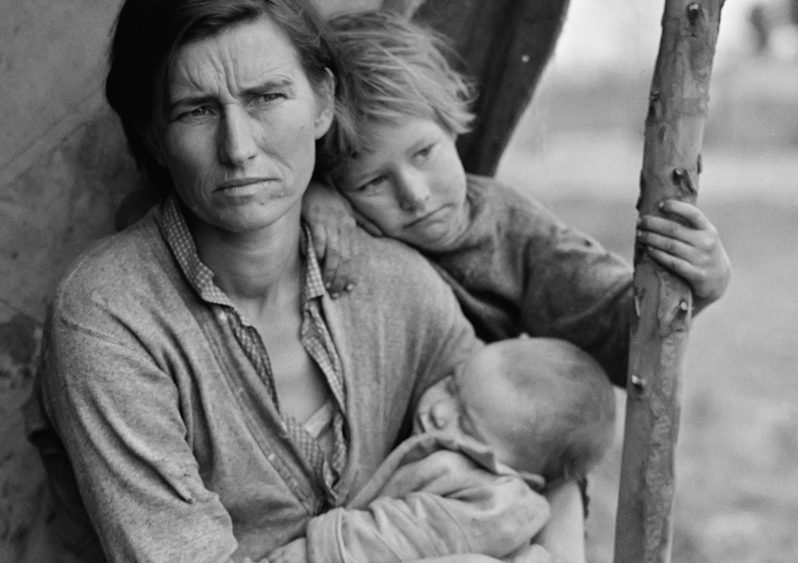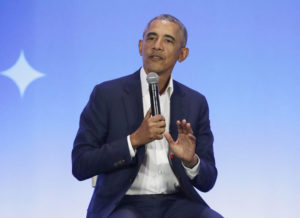Dear Bill Clinton: The End of Welfare Isn’t the End of Poor People
Isn't it great how we solved the welfare problem? That's the one thing that former President Clinton, Congress and even the media agree on. Isn't it great how we solved the welfare problem? That's the one thing that former President Clinton, Congress and even the media agree on. Dorothea Lange via C. Thomas Anderson (CC BY-SA 2.0)
Dorothea Lange via C. Thomas Anderson (CC BY-SA 2.0)
Editor’s note: This piece was originally published by the Los Angeles Times on Feb. 23, 1999. Truthdig is republishing it on the 20-year anniversary of President Bill Clinton’s signing of the welfare legislation.
Isn’t it great how we’ve solved the welfare problem? That’s the one thing that President Clinton, Congress and even the media agree on. Gosh, those welfare rolls are declining so fast that we’re just going to run out of poor people.
But where have they gone? Are they better or worse off? Since most of the welfare population was composed of single mothers and their children, it would seem to be morally relevant to at least inquire as to how those children are doing. The answer is, not very well.
Despite a decade of sustained economic growth and low unemployment, the percentage of children living in poverty–one in five–is the same as it was in 1989. Those census data are the best we have, but they’re a year old.
We don’t have more recent data because folks who are running welfare reform at the federal and state levels act as if they don’t really care what happens to those women and children once they’re pushed off the rolls. Out of sight, out of mind is the rule of welfare reform. Success has been measured by reducing the rolls rather than reducing poverty.
Consequently, we have only fragmented and largely anecdotal information on what happens to those thrown off what was once a federally monitored welfare system and who now experience the vicissitudes of a hodgepodge of state programs. Yet what we do know is alarming.
Clinton has pointed to the Wisconsin program as a stellar example of the success of welfare reform. Indeed, Wisconsin has been the nation’s model, and welfare rolls in that state have experienced the most impressive decline: a staggering 75%, including mothers of 3-month-olds who have been forced off welfare.
But in a recent survey, the state conceded that for most who left welfare, getting low-paid jobs did not leave them better off. Despite costing taxpayers more to run the new program, the survey found that most of those families were not economically better off.
No matter, those most enthusiastic about welfare reform argue, the fact that the mother is working means she’s a better role model for her children. But last Sunday’s New York Times exposed the shocking condition that young children, many abandoned by their hard-pressed mothers, find themselves in as a consequence of the highly touted “Wisconsin Works” welfare reform: “Unwilling or unable to work for public aid, many of the state’s most troubled mothers have lost their benefits, often en route to drug clinics, jail cells, shelters or the streets. And grandmothers . . . –angry, worried, or plain exhausted–are being left to care for the children abandoned along the way.”
“Wisconsin Works seems to have worked magic,” reported a correspondent for London’s Observer newspaper. “But behind the slogans a more disturbing picture is emerging, of mothers denied benefits becoming so desperate that they are abandoning their children either to the government or to grandparents, of church hall basements overflowing with the mothers and youngsters sleeping on aerobics mats.”
The problem is not with the goal of moving people off welfare into decent jobs, but rather the lack of jobs that lift a family out of poverty.
In a national survey, the Children’s Defense Fund, with which Hillary Clinton has long been associated, revealed the majority of jobs found by former welfare recipients paid well below the poverty level. How can she or her husband continue to endorse a program that pushes millions of children deeper into poverty?
To be fair, there are several measures pending that the president supports that could move us further toward requiring jobs to pay a living wage. One is an increase in the minimum wage and another is an expansion of the earned income tax credit.
But the bottom line is that what now passes for “welfare reform” represents the abandonment of millions of children and we are, as the president is fond of pointing out, in the best of times. When the economy dips, as it surely will, the risks for those and many other children will dramatically increase.
Clinton is correct in stating that we now have the smallest welfare rolls in 30 years, close to what they were in the 1960s before Lyndon Johnson launched his “war on poverty.” There are still 36 million Americans living in poverty, 40% of them children. That is unconscionable in a time of wild run-ups of the stock market wealth of the “other America.” But instead of a war on poverty, Bill Clinton has settled for a war on welfare recipients, and that is hardly the same thing.
Your support matters…Independent journalism is under threat and overshadowed by heavily funded mainstream media.
You can help level the playing field. Become a member.
Your tax-deductible contribution keeps us digging beneath the headlines to give you thought-provoking, investigative reporting and analysis that unearths what's really happening- without compromise.
Give today to support our courageous, independent journalists.




You need to be a supporter to comment.
There are currently no responses to this article.
Be the first to respond.